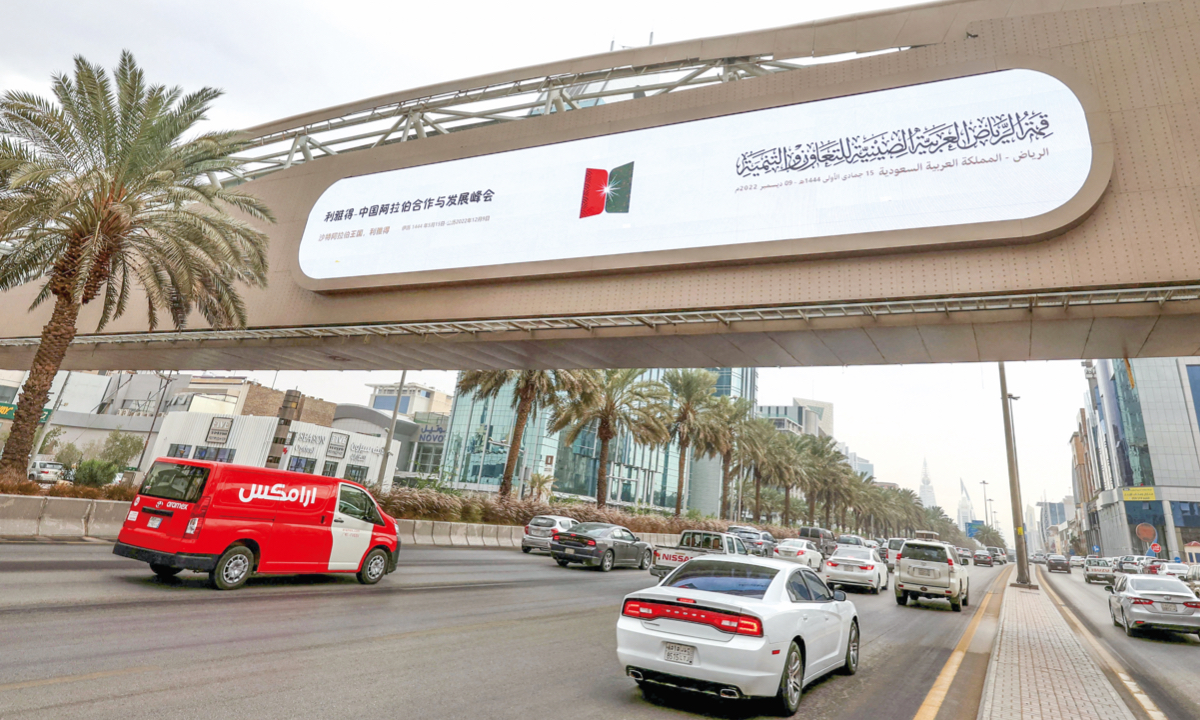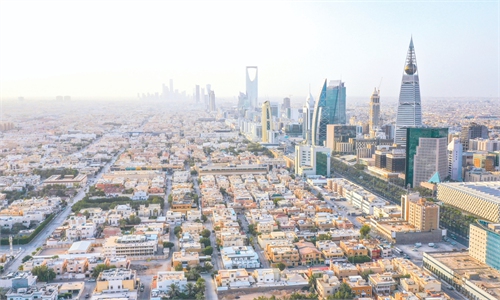
A billboard for China-Arab States Summit is seen on December 7, 2022 in Riyadh, Saudi Arabia. Photo: VCG
Editor's Note:"The Belt and Road Initiative (BRI) can be in harmony with the Saudi Vision 2030, and benefits are always expected," said Fahad Almeniaee (Almeniaee), director of the China and Far East Unit of the Riyadh-based Center for Research and Intercommunication Knowledge. He noted that if the Arab countries and China make joint efforts to enhance theBRI, they will have a better situation in the future. As Chinese President Xi Jinping is visiting the Kingdom, Almeniaee accepted an interview from Global Times (GT) reporters Yu Jincui and Xing Xiaojing in Riyadh to share his views about how the two countries should better cooperate within the BRI framework, as well as deepening relations.
GT: In 2016, when President Xi visited Saudi Arabia, China-Saudi Arabia relations were upgraded to a comprehensive strategic partnership. Xi is visiting Saudi Arabia again and Saudi Arabia is the first Arab country that he visits after the 20th National Congress of the Communist Party of China (CPC), how should we understand the importance of this visit to bilateral relations?
Almeniaee: There is no doubt that this visit is historic because the Kingdom of Saudi Arabia values its relationship with China, especially the presence of the Chinese President in Riyadh himself, and there will be a further improvement in the relationship. The relationship between the Kingdom of Saudi Arabia and China is a multi-faceted one, ranging from trade to culture. In fact, it is a mutual exchange of interests between the two countries, as well as a relationship of deep friendship. China is Saudi Arabia's largest trading partner, which contributes to the development of this relationship. The summit will yield important results and outcomes that China is looking for in the region.
GT: How do you evaluate the cooperation between China and Saudi Arabia over the past six years? In your opinion, in what areas can the two sides further deepen cooperation?
Almeniaee: In the past few years, cooperation between China and Saudi Arabia has reached its peak, and Saudi Arabia and China have succeeded in establishing several successful companies in energy projects, advanced industries, etc.
As for the areas that both sides should deepen, they should invest in giant projects in Saudi Arabia, such as the NEOM project (a city connects Asia, Africa and Europe being built in Tabuk Province in northwestern Saudi Arabia). Investing in Saudi Arabia through Chinese companies will undoubtedly be beneficial to the economies of the two countries.
GT: The relationship between the US and Saudi Arabia has deteriorated because Saudi Arabia has rejected to cooperate with the US on the adjustment of oil production, the Russia-Ukraine conflicts and other issues. What are the underlying reasons for the deterioration of US-Saudi relations?
Almeniaee: There have always been ups and downs in international relations. Saudi Arabia's relationship with America has been a historical one for more than 80 years. The strongest side in Saudi-American relations cannot be shaken and is centered on the security aspect and the strategic alliance. The noticeable path of fluctuation in relations is related to the economic aspect, as Saudi Arabia is the largest source of energy in the world, which finds itself exporting energy to China. It means that Saudi Arabia follows its economic interests, and this does not mean at all a shift in strategic relations.
The US cannot abandon the region due to its geographical location, essential security role, and dealing with events there. As for China, it does not have the desire to be a security ally of the countries of the region for two reasons. The first is historical, represented by its historical absence in the region, and the second reason is that its relations with all countries in the region are horizontal, without interfering in regional conflicts in the region.

Fahad Almeniaee. Photo: Courtesy of Almeniaee
GT: China's normal relations with the Middle East are often portrayed by the Western media as "China poses a challenge to the US' dominance in the Middle East." What do you think of such claims in the West?Almeniaee: It is not true. The US-Chinese competition in the region is incomparable in its strategic aspects. The Chinese presence focuses on the economy, while the US presence is a security presence based on strategic and economic alliances along with a long history of direct relationships. As for the Chinese presence, it is focused on economic development emanating from the BRI.
GT: What kind of opportunities and influences do you think the BRI has brought to Saudi Arabia and other countries in the Middle East?
Almeniaee: I believe that the BRI can be in harmony with the Saudi Vision 2030, and benefits are always expected. An example of the convergence of the two projects is how Saudi Arabia has taken steps toward the revival of the Silk Road project by establishing the Saudi Silk Road Company in the Jizan region, in which there are many Chinese companies. These companies work in energy, contracting, and other fields. This region is one of the new economic arms of the Kingdom, which will contribute in attracting many foreign investments in various fields: agriculture, tourism, industrial, etc.
GT: President Xi will attend the first China-Arab States Summit and the China-GCC Summit in Riyadh. What is the driving force for closer cooperation between China and Arab countries?
Almeniaee: It is expected that at these summits there will be a desire for closer economic relations between the two sides that have equal importance at the present time in strengthening Chinese-Arab relations, as it is expected that they will have a better situation in the future, if the Arab countries and China make joint efforts to enhance the BRI. Its design came as a diplomatic and economic framework based on the principle of broad consultation, joint contribution, and mutual benefits. Practical cooperation in the field of energy will also be modernized, such as establishing basic infrastructure and facilitating trade and investment as two important aspects of this cooperation and the exchange of high and new technologies in the fields of nuclear energy, renewable energy and space satellite technologies.
China and the countries of the region look forward to closer and deeper cooperation in the future through several important areas, for example: Mutual political trust and security cooperation; development, economic and trade cooperation; communication and mutual benefit between civilizations.
GT: Can you briefly introduce your relations with China? For example, when did you start studying China? What China-related topics interest you most?
Almeniaee: Yes, I have a long relationship with China and the Chinese, starting from my studies in Beijing at the university in 2007 until this day.
I stayed in Beijing for six years, during which I learned the Chinese language, made wonderful friends, and also got to know the Chinese and China closely. I learned about the culture and interests of the Chinese people, and currently, I work in the Center for Research and Knowledge Communication as the director of the China Unit in the center. As for the topics that interest me and are related to China, I am interested in all fields of knowledge, such as civilization, culture, and, more recently, the economy.


